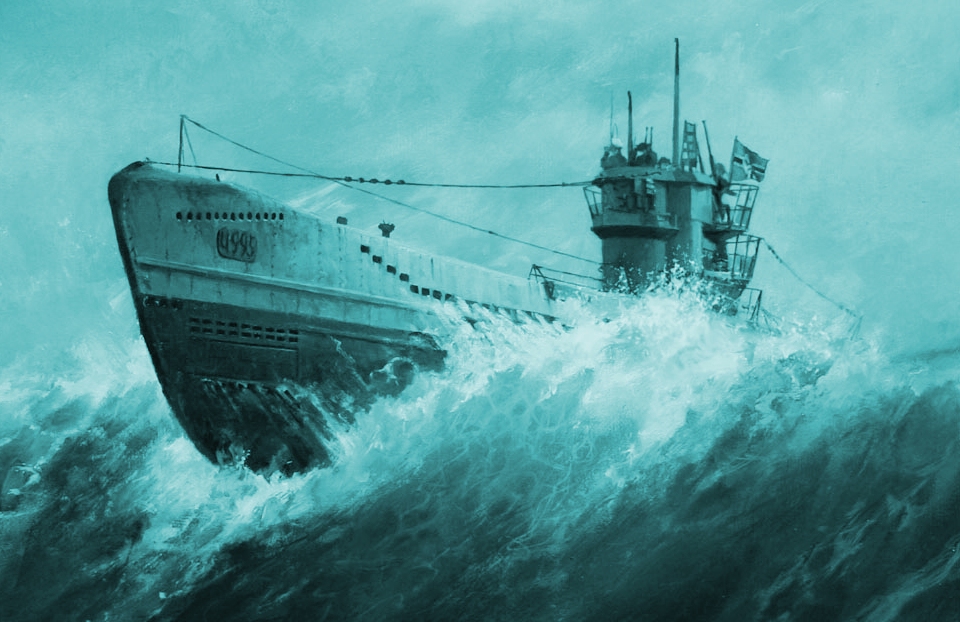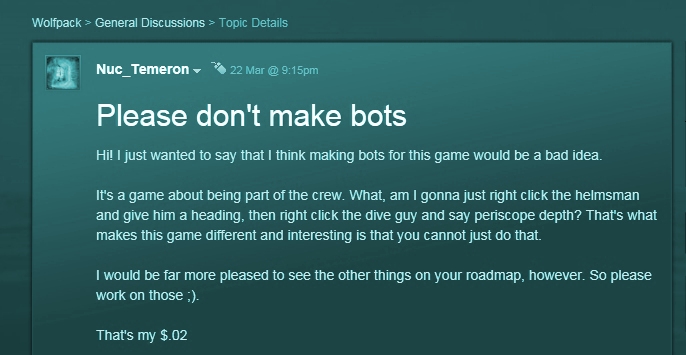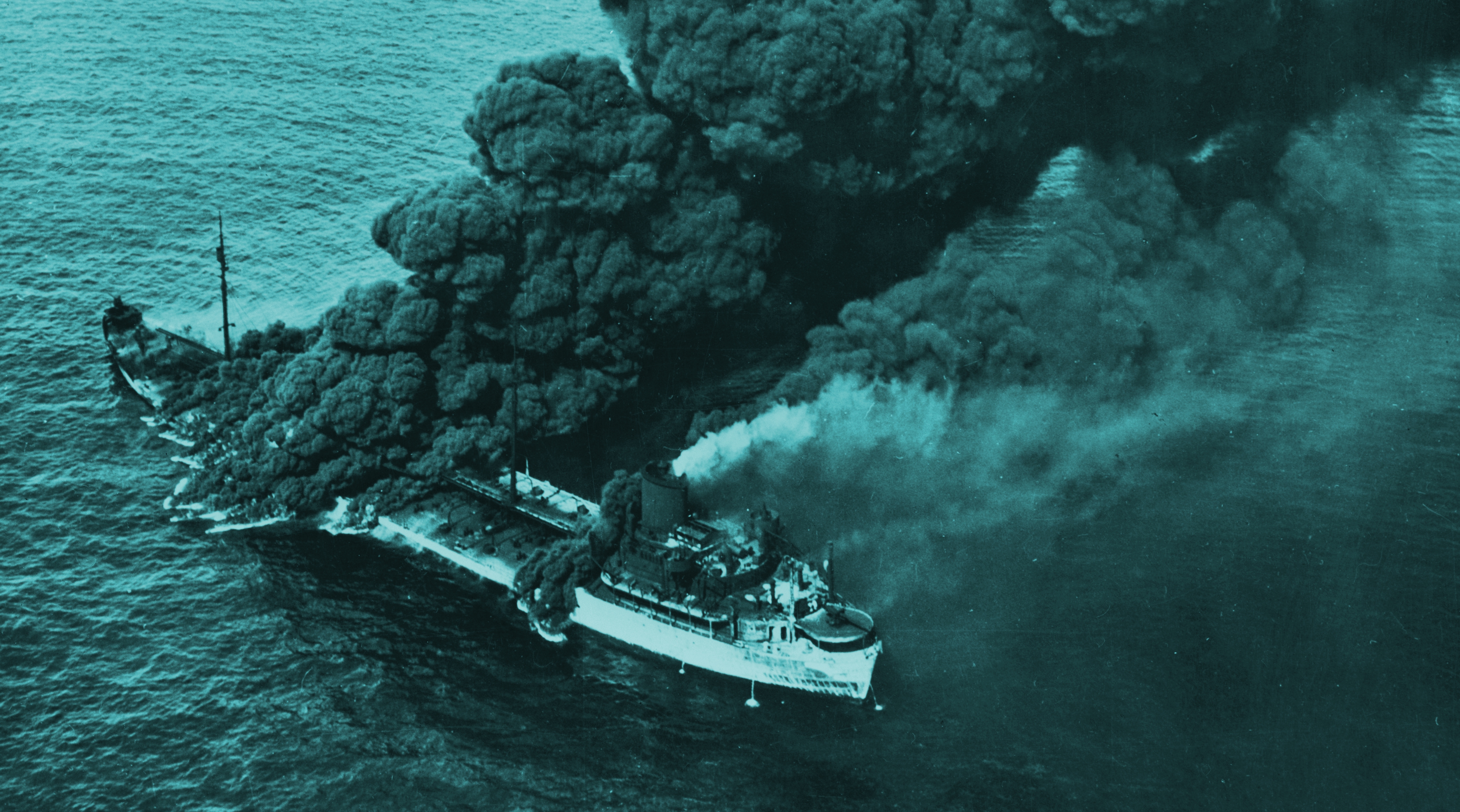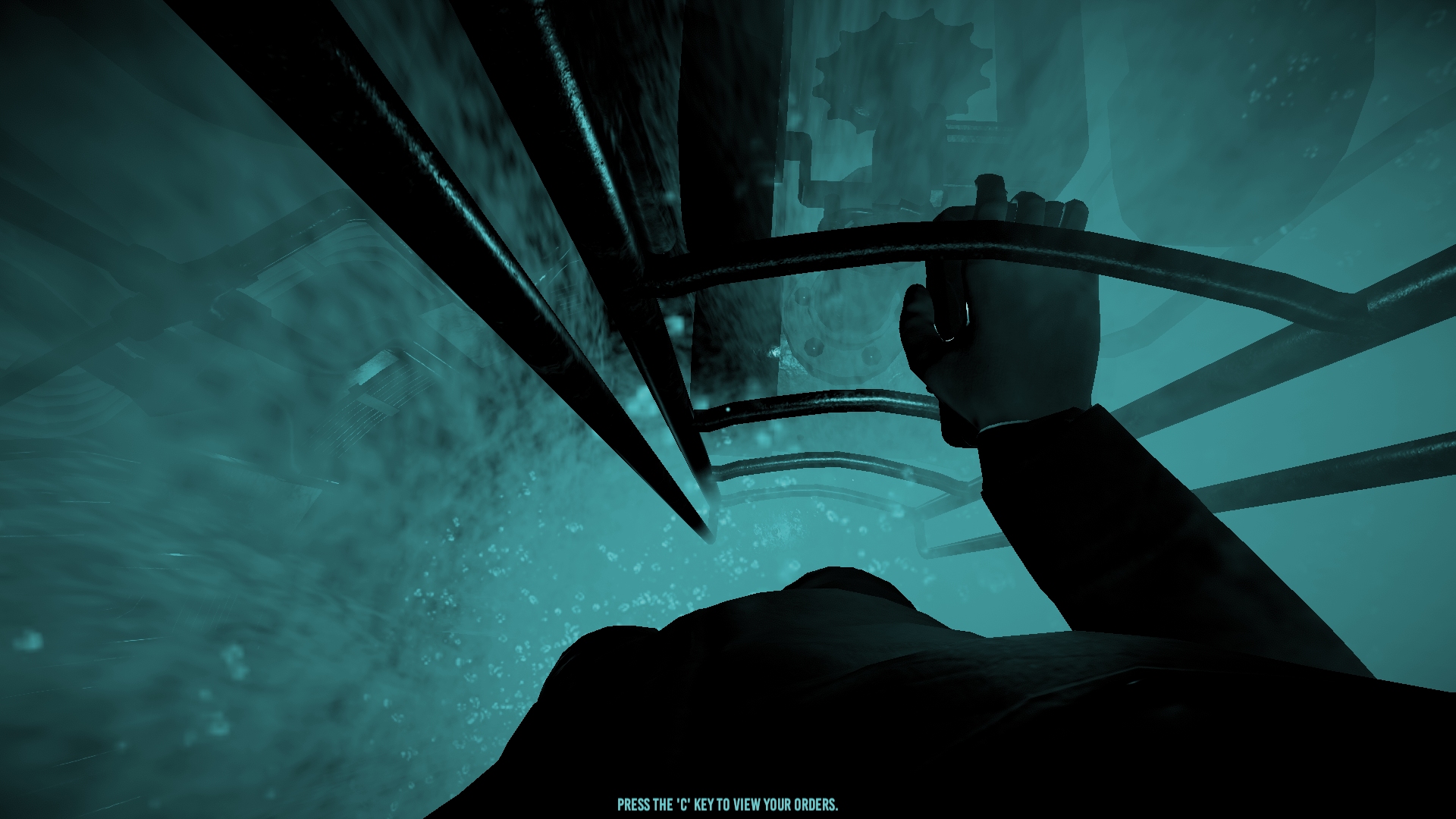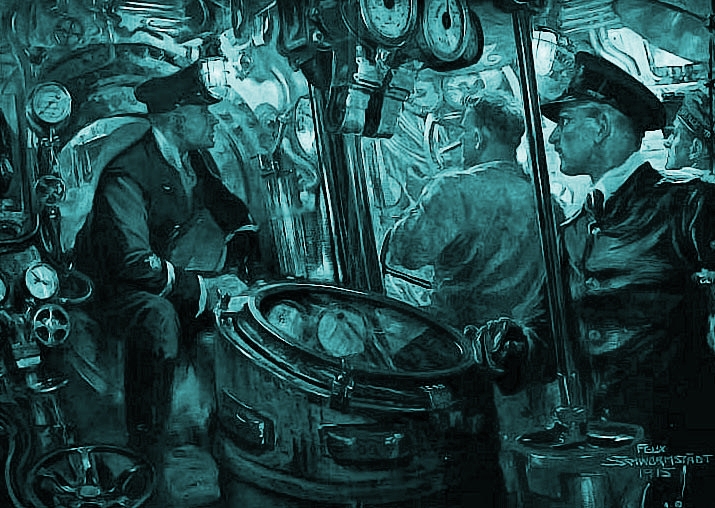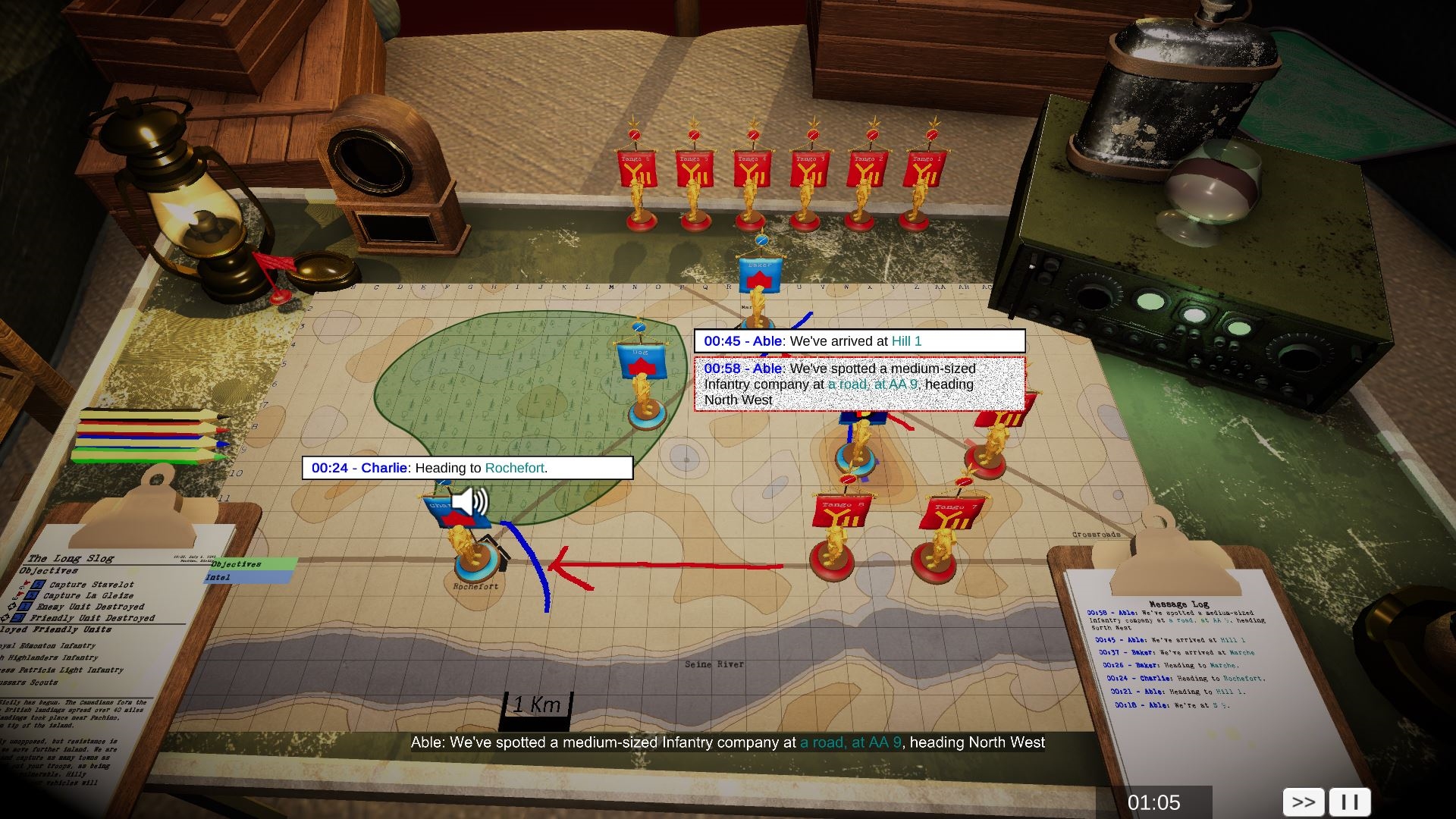The Flare Path: April Cowers
Wolfpack, Steel Division 2, Radio General
By next Friday I should have answers to all these questions... How do AI-controlled Steel Division II attackers react to player-deployed obstacles like barbed wire and trenches? Are new commands like Quick Hunt (unit uses roads while stalking) and Efficient Shot (unit will only open fire when hit and penetration chance is over 40%) as useful as they appear? Is the new radio mechanic (units bombarding targets within the 'aura' of a friendly radio owner enjoy greater accuracy) clever shorthand or a half-hearted sop? Are 'command chains' (buff-transmitting strings of leaders anchored by new commander units) a fiddly distraction or a welcome nod to serious tactical titles like Combat Mission and Graviteam Tactics?
Sadly, the militant-until-Monday Steel Division II public beta won't answer the question I'm most curious about. Limited to skirmish and multiplayer clashes on three maps (Tsell, Lyakhavichy and Orsha North) with four 'divisions' (5th Panzer Division, 78th Sturm Division, 26th Rifle Division, and 2nd Guards Tank Army) the hors d'oeuvre reveals nothing about the full game's dynamic campaign layer - a game-within-a-game that promises to make SD2's Operation Bagration feel far less staged and episodic than SD1's Operation Overlord.
If you're not in a position to spend the weekend grilling Grilles and sinking Schwimmwagens (the beta is confined to pre-orderers) and have SD2 questions, pop those questions in the comments section and I'll do my best to answer them in next week's FP.
* * *
Wolfpack's steep learning curve, sealed hatches, and single-minded focus on co-op crewing don't appear to be holding it back. A fortnight after the Early Access launch, the forums are still buzzing, and the Steam review section remains bluer than a PR Spitfire painter's overalls. With bots and Royal Oak felling on the horizon, I thought I'd catch-up with Subsim.com's Neal Stevens, a man who believed in the project to such an extent that, back in 2016, he crossed the herring pond to work alongside its creators.
RPS: When we last spoke you had just upped sticks and moved to Sweden to take part in Wolfpack's development. How did the time with Skvader/Usurpator go?
Neal: It was a fantastic experience, meeting Oscar and Einar and going through a million details over what we wanted Wolfpack to become. They had started the project off nicely with their inspired Marulken demo. Our goal became moving it to the next level with a highly detailed U-Boat in historical scenarios that provided a hands-on experience that would be new ground for subsimmers. We travelled to Germany to get a VIP all-access tour of U-995 and it was obvious these guys were serious about making their U-Boat as detailed and authentic as possible - they were in the sub talking, taking pictures, asking questions - literally scrutinizing every nook and cranny. It takes a normal person 45 minutes to walk through the Boat and see everything; the devs were in there for 13 hours.
RPS: Judging by forum activity the sim has sold pretty well thus far. Assuming you had sales targets, have they been hit?
Neal: Yes, we are happy with the sales thus far. It's going well, especially considering Wolfpack is a niche game in early access. I think the game's success will continue as time goes by and the game gets more polish and historical missions. It's important to remember, the devs spent a considerable amount of time creating this game; every valve, searchlight, sonar ping, and a thousand other crucial details represents three years of their lives.
RPS Is it still just the three of you?
Neal: Yes. Oscar does the programming, Einar handles graphics, sound, tutorial videos, and marketing, and I offer input and ask a lot of dumb questions.
RPS: Do you have any sympathy for players who think bots shouldn't be added to Wolfpack?
Neal: Well, sure, but I think gameplay with bots can be handled in a separate system than the co-op game players. I am aware of the significant number of players who want the procedural hands-on experience that Wolfpack offers but prefer to play solo. It could be time constraints, it could they don't have a social network of friends who live in the same time zones.
I know a lot of Subsim alumni would like to learn and play Wolfpack solo to hone their skills before venturing into co-op waters. We would like to offer them a chance to Lone Wolf the game, too. I think of solo play as the recruiting tool for eventual co-op play, because nothing beats working with a crew in a U-boat. It's like watching Das Boot except you are in the movie!
RPS: Have your campaign plans altered since you posted this tempting outline in 2016?
Neal: That's still the plan and so far we are on track. Upon initial release Wolfpack features the Convoy Encounters as promised for dynamically generated skirmishes. Next up is the Scapa Flow mission, where the crews will need to study German intel and get past unfavorable tides, anti-submarine nets, searchlights, coastal batteries, and blockships to sink the Ark Royal. I also want an alternate version where you have to penetrate a non-historical harbor with unknown defenses because we all know how Scapa Flow is supposed to work.
We have several other scenarios outlined, such as sneaking through the Straits of Gibraltar, shelling a Russian base, refuelling at sea with the help of a Milch Cow, and Operation Drumbeat. Then we can expand the career timeline to include 1942 - 1945. When they are completed, we can stitch them together into a historical campaign.
RPS: Discouraging griefing while allowing new players room to make mistakes looks like a thorny developmental challenge. Do you have plans in this area?
Neal: I trust the goodwill of the Wolfpack community. I've played a lot of missions since the game's release with random people. True, you will get a few goofballs who not very serious about the gameplay, but in my experience, veteran players can coach and guide them to being better crewmen. I am confident there are many capable role models in Wolfpack who can gently knock less experienced players into shape.
Plus, we are adding a "Kick bad player" option to the game. I am campaigning to have it called "Bad crewman overboard".
RPS: In your opinion which role is the most beginner-friendly at present - which the most demanding?
Neal: Being the helmsman is the easiest role, just changing speeds and course, handling the battery charge, and managing the forward ballast tank vents and the compressor and bilge pump. Being a really good sonar guy (radioman) is the hardest. It's pretty tough translating hydrophone sounds into ships' courses and speeds.
When we get the harbor missions out, maybe being navigator will challenge the radioman. Oscar has built a map system that could be a game all itself. The navigator will need to mark every turn, course change, and account for the distance between legs in order to keep track of the sub's position - the map sure as hell doesn’t auto-update.
RPS: I recently read an account of a WW1 U-boat attack in which an unlucky sub found itself being pushed towards the seabed by the hull of one of its victims. Is such a situation possible in Wolfpack?
Neal: No because Wolfpack takes place in WW2 ;)
Plus, we don’t have a seabed (yet).
RPS: Thank you for your time
* * *
The days when wargame devs saw military radios as stylish menu screen disguisers and nothing else are definitely over. When, a month ago, I shared some early impressions of Radio Commander - a Vietnam War tactics game with fog-of-war so thick you could stuff a sleeping bag with it - I was unaware it had a WW2 rival. Announced before RC, Radio General is another in-development Unity-engined RTS keen to confine us to a behind-the-lines tent where we'll follow and orchestrate distant ding-dongs with the help of a graffitied map and a red-hot radio. Intrigued by the concept and curious about a recent gap in video transmissions I contacted designer Michael Long.
RPS: How is Radio General progressing? Hopefully the dearth of devlogs during the last six months isn't significant?
Michael: It's progressing well. I've been working Radio General part-time for over a year now while doing grad studies at university, and now that I've got my degree I'm about to start full-time. Super exciting! In terms of video devlogs, I got so busy and had so few people watching them I just felt they weren't worth the time, though I will definitely resume them now that I'm going full-time. My latest newsletter has some new images and features that I've been working on.
RPS: Can you trace the project's origins back to a particular book, documentary, or eureka moment?
Michael: The original idea came a long time ago when I was trying to hang out with one of my friends in high school. I called him asking where he was, and he said he said he was in some park he didn't know the name of (and for some reason he didn't go looking for nearby street signs). I then asked him to describe his surroundings, and mentioned seeing a nearby hill. Eventually we figured out which direction the hill was in relation to him by looking at the sun's position. I pulled out a paper map from the glove compartment of my car (this was before the days smartphones were common), and finally figured out his position. The whole process of deducing his location using only verbal descriptions was surprisingly fun, and I thought "I can make a game out of this." The whole war and RTS aspect came later as I played Company of Heroes, and I really liked the look of the expanded minimap view (pictured above). It just clicked that I could make a game featuring just a blank map, and you need to talk to your units to command them. Making a full-blown RTS without a massive budget would be crazy, but the fact everything is hidden would reduce art costs massively, and it was such an interesting idea I just had to start on it right away.
RPS: In your initial concept vid you mention the lack of "immediate feedback" as a potentially off-putting element of the design. At this point in development is it still a concern?
Michael: Yes! The premise itself should be interesting enough to get people to play the game, but the hard part is to make sure they are engaged while playing at all times. This is difficult, as when you tell a unit to move to a far-away position, it's going to take a while for them to get there, and nothing is visibly changing or moving on the map while they are in transit. Waiting too long is boring. There are two ways to make it less boring: make sure there's always other stuff to do (check in on other units, random events happening, reports or briefings to read, drawing on the map) or allow players to alter the timescale (permit fast-forwarding to skip long boring periods, whilst allowing pausing to give yourself time to think during hectic parts). Careful mission design can also help.
RPS: Radio Commander may end up stealing some of Radio General's thunder. Do you think the games are sufficiently distinct to co-exist rather than compete?
Michael: Yes, it's unfortunate Radio Commander will likely be released before Radio General, despite the fact I started development before them. In future I will be much more careful of when I start posting videos on completely unique game ideas, and only post when the game is much further along. As for differences between the games, Radio Commander appears to focus on much smaller engagements and be more focused on the narrative aspect (banter between you and your units). Radio General is much more focused on being a fully-fledged RTS, with an emphasis on tactics, strategy and accomplishing objectives. Each side has different objectives for each scenario, and each objective will have its own point value (e.g. Allies need to capture towns, Axis need to simply inflict casualties while preserving their tanks). The outcome of a match won't just be a binary win/loss, as it's seldom so clear-cut in war. Instead it's about how well you do relative to the enemy's objectives. This will be reflected in the campaign, where you will be able to 'lose' missions, but still progress (losing will actually give you access to more units, as command thinks you need them).
Radio General will also have much larger engagements, and you'll have to cope with the chaos of commanding large numbers of units in set-piece battles. WW2 has varied settings, and plenty of battles to choose from (though I focus on the often overlooked Canadian contribution to the war since I'm Canadian). Lastly, Radio General will feature online co-op and competitive multiplayer. Imagine being in online voice chat with three of your friends coordinating massive battles, with each player commanding their own units and focusing on their part of the battlefield. You'll be able to see where your allies draw on the map and position their figurines, and it should be reminiscent of those old WW2 war-rooms with the officers gathered around the table with the pushy-sticks.
RPS: Thank you for your time
* * *






